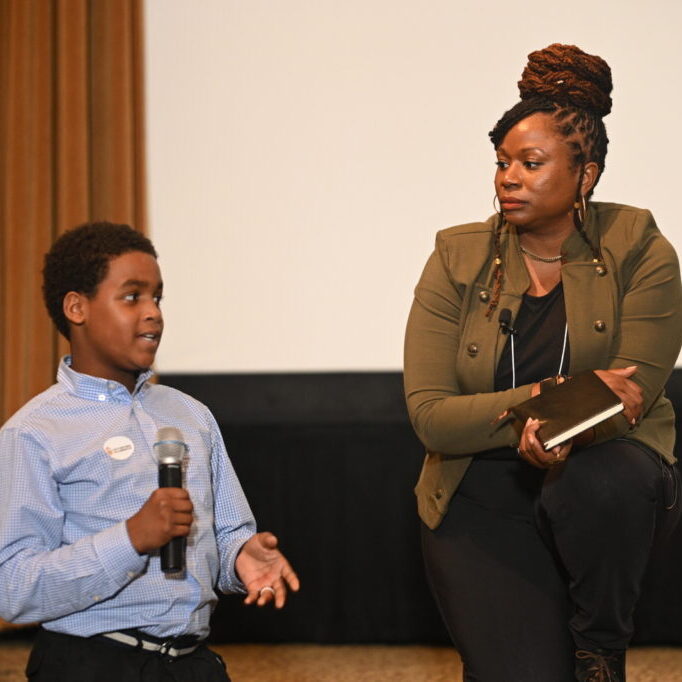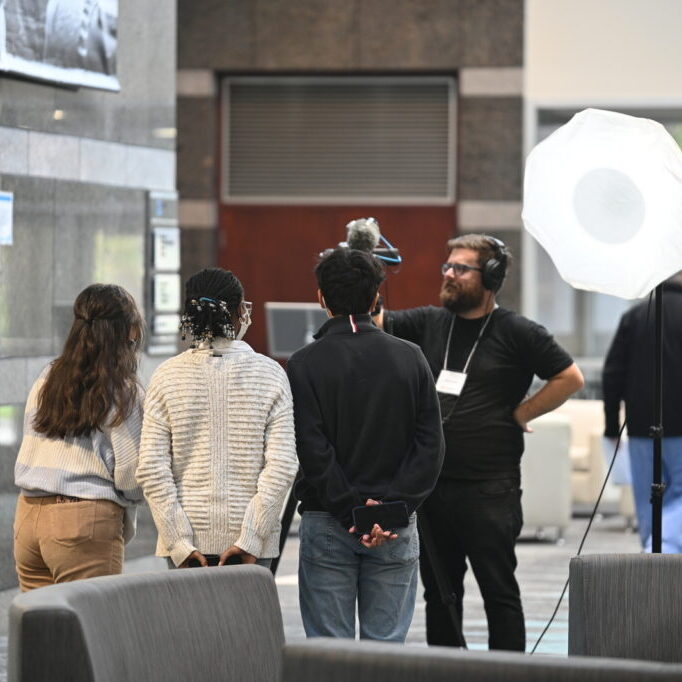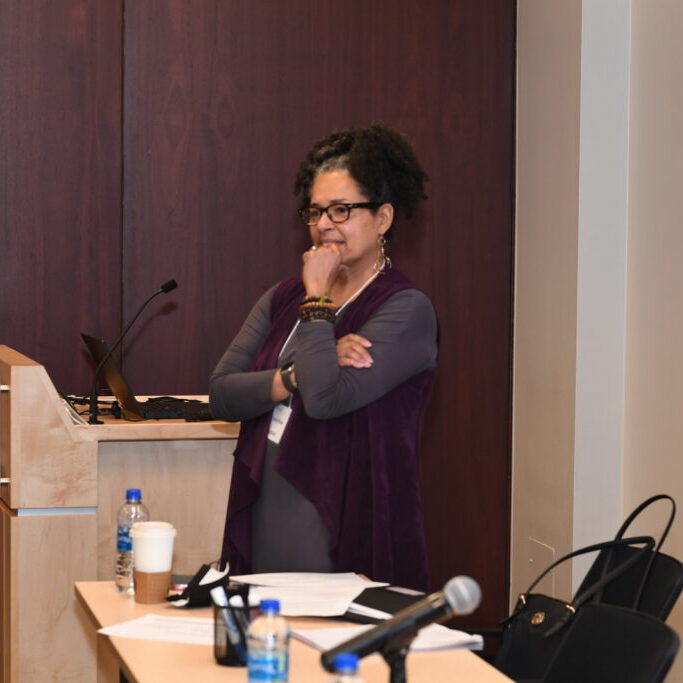About the Durham Youth Mentoring Alliance
In Durham, better coordination among mentoring organizations and increased awareness about available resources have been priorities for Durham City Council for several years. These include creating a mentorship map, convening mentorship organizations for visioning conversations, providing skill-building and training opportunities for organizations, and providing incentives for young people and families to participate to reduce barriers to access. In 2023, due to advocacy from Councilmember Dr. Monique Holsey-Hyman, the Council allocated funds to focus on mentoring priorities and asked the OOY to coordinate implementation.
As a result, Youth Mentoring Collaborative (YMC) partnered with the Durham Office on Youth (OOY) and a core group of youth-serving organizations and Youth Ambassadors to facilitate the creation of the Durham Youth Mentoring Alliance. This initiative will unite mentoring organizations, young people, and community members across Durham to remove barriers to collaboration between organizations, expand access to evidence-based mentoring for young people, and create opportunities that all Durham youth and families need to improve their overall quality of life.
Download the Phase I Report: Collaboration, Not Competition
Throughout Phase I of building the Durham Youth Mentoring Alliance, YMC and the Core Team endeavored to facilitate new mentoring partnerships, connections, and engagement opportunities for young people by bringing various stakeholders across Durham together to identify shared priorities and inform an action plan to guide the next steps. Our findings report "Collaboration, Not Competition: Building a Durham Youth Mentoring Alliance" represents our effort to solicit feedback about the data, elevate the findings, and address any key issues.
Summary of Recommendations and Next Steps
Below is the summary of recommendations to remove barriers to collaboration between organizations, expand access to evidence-based mentoring for young people, and create opportunities that all Durham youth and families need to improve their overall quality of life, particularly those most impacted by systems of oppression.
Regularly involve youth voices in the planning, delivery, and decision-making of mentoring programs
According to the Search Institute’s Developmental Relationships Framework, sharing power with young people is a key way to demonstrate that you take them seriously by forging opportunities for them to take action on issues that impact them. While the findings from youth, providers, and caregivers highlighted programs’ effectiveness in creating inclusive, welcoming environments that foster feelings of belonging, trust, and community, programs struggle to honor youth voices and share power with the participants in their programs. This, coupled with programming and approaches that do not speak to the current needs of youth, leads to disengagement and attrition in programs. By collaborating with youth and giving them a say in programmatic decisions, mentoring programs in Durham will gain the opportunity to create more meaningful, enriching experiences for their youth.
Potential Action Steps
- Collaborate with youth leaders to develop initiatives, partnerships, programs, and content
- Provide key resources and training that directly support the ecosystem of youth leaders
- Build and support Youth Mentoring Leadership Councils
Create more opportunities for adults to connect with and become mentors to youth, with a focus on recruiting, screening, and training mentors with the attitudes, knowledge, and skills to be effective in the mentoring relationship
The importance of recruiting appropriate mentors, screening them to determine whether they can be safe and effective mentors, and training them on various topics that promote the success of the relationship represent three of the six Elements of Effective Practice for Mentoring™, a guiding resource that provides insights and recommendations on how to deliver high-quality mentoring experiences for young people. Data provided by youth, providers, and caregivers highlighted the clear strengths that programs have in attracting mentors who express care, push their mentees to live up to their potential, and expand their perspectives on what’s possible for their futures. To build on these positive aspects, programs could benefit from greater investment in incoming and current mentor training that focuses on the history of mentoring and positive youth development, key components of effective mentor-mentee relationships, child and adolescent development, the impacts of identity in mentor-mentee interactions, and other topics that support the ongoing growth and development of mentor skills to support young people. Mentoring programs in Durham that commit to evidence-based standards in their program delivery have a greater likelihood of attracting mentors that best match the goals of their program as well as increasing overall relationship satisfaction and longevity between mentors and mentees.
Potential Action Steps
- Partner with organizations to host mentor recruitment fairs to share local mentoring opportunities for youth
- Provide training to mentors to ensure quality standards in all mentoring areas, including, but not limited to youth advocacy and power building, mentoring LGBTQ+ youth, culturally relevant mentoring practices, adolescent mental health, and other topics
Regularly convene youth and mentoring organizations for relationship-building, sharing best practices, skill development, and having fun together
Collective impact is the act of multiple organizations aligning efforts, sharing data, and coordinating activities to achieve a greater impact than one organization could do alone. In the context of mentoring programs in Durham, youth, providers, and caregivers all expressed a desire for greater collaboration across programs that support networking, sharing resources, and “cross-pollination” to build a community of support. Adopting a collective impact approach for mentoring programs in Durham with coordination from a backbone agency will support more comprehensive and dynamic mentoring experiences for youth and programs.
Potential Action Steps
- Identify a dedicated backbone agency to coordinate ongoing collaboration between mentoring organizations in Durham
Support mentoring organizations through training, coaching, physical space for direct-service programming, financial resources, and other identified supports that lead to long-term sustainability and lasting impacts on mentors and mentees
According to the National Council of Nonprofits, Capacity building is whatever is needed to bring a nonprofit to the next level of operational, programmatic, financial, or organizational maturity, so it may more effectively and efficiently advance its mission into the future. Capacity building is not a one-time effort to improve short-term effectiveness, but a continuous improvement strategy toward the creation of a sustainable and effective organization. Providers and practitioners reported a need for various resources, including funding, specialized training for mentors, physical space for programs to conduct direct-service activities, and other supports that would increase their abilities to carry out their respective missions. Most programs nationally have meager financial resources; in Durham, 55% of mentoring programs have a budget of below $200,000, with 46% of programs having budgets under $50,000. With increased funding and capacity-building support, mentoring programs in Durham will be positioned for greater impact and sustainability, ultimately leading to higher-quality programming and longer-lasting mentoring relationships.
Potential Action Steps
- Identify and engage mentoring agencies in various training and consulting services, including planning and design, management, operations, evaluation, and other program-related needs to provide high-quality mentorship programming
- Advocate for legislation, policies, and public funding streams to support the mentoring movement (examples below)
- Invest in programming and initiatives that support youth mentoring across Durham
Increase the public’s general knowledge of mentoring opportunities through a searchable map with mentoring programs, partnership with Durham Public Schools to inform and connect youth and families with mentoring programs, and public awareness campaigns
Youth reported that word-of-mouth was the most consistent way they became involved with mentoring programs; this approach is supported by research and scalable through technology. In-person recruitment visits at schools and in the community were also reported as techniques used for mentee recruitment. Providers and caregivers reported a need for better outreach to young people, specifically ways to inform the community about existing programs to support enrolling more people. A coordinated effort to communicate with known programs and identify unknown programs in Durham to stay current on specific mentoring programs and stakeholder needs would increase the general public’s knowledge of mentoring opportunities.
Potential Action Steps
- Regularly collect data to understand the youth mentoring landscape, identify gaps, and share findings to increase understanding of the need for mentoring, best practices, and its impact
- Enroll programs in searchable mentoring map
Reach out with questions or feedback!
For more information about the development of the Mentoring Map and the Durham Youth Mentoring Alliance, contact Lara Khalil at Lara.Khalil@durhamnc.gov or Sontee Dean at sdean@youthmentoringcollaborative.org

Our Guiding Principles
Learn more about how YMC conducts our work through the lens of racial equity.

Stay Up-To-Date
Find YMC's current happenings, news, and op-eds on our blog.

Consulting Services
We are here to help guide your organization with evidence-based research. Apply for consulting.